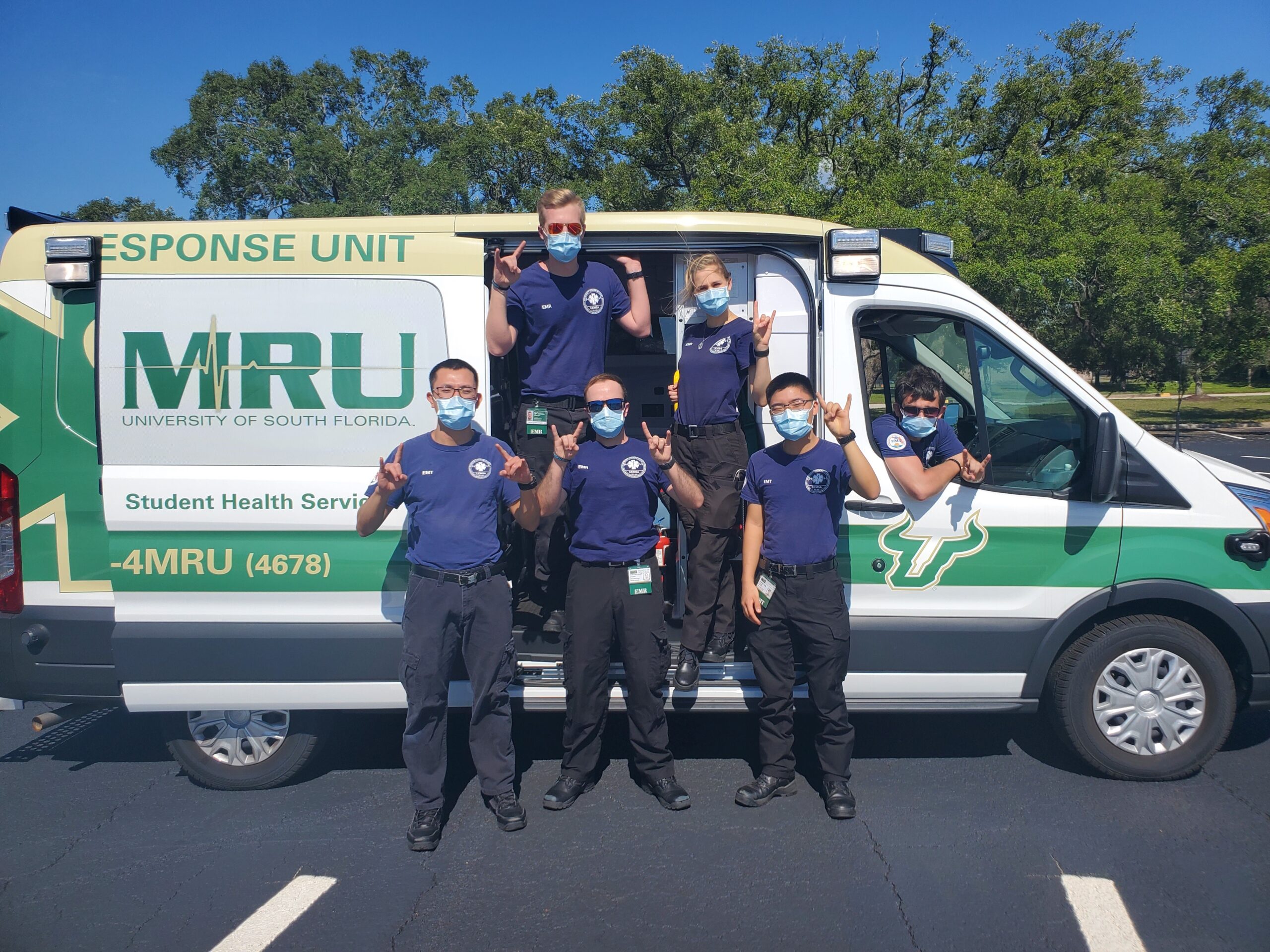Medical Response Unit contributes to COVID-19-related services

On Valentine’s Day last year, the Medical Response Unit (MRU) parked itself for the first time on campus outside of the Marshall Student Center, ready to respond to medical calls at the Tampa campus. With COVID-19 running rampant shortly afterward, its mission has since not proceeded as expected.
Founded to provide free “on-scene Basic Life Support (BLS) medical interventions” to the USF community, the MRU’s plans have changed as a result of the decline in campus activity caused by the pandemic.
Instead of a decline in work, the MRU has taken on different responsibilities like staffing COVID-19 testing sites and has still provided 165 clinic days worth of medical coverage, 33 medical and courtesy transports for patients in the MRU vehicle to Student Health Services (SHS) and 30 instances of medical standby services for special events.
Over the summer, the MRU was designated as an essential service to USF’s operations during the pandemic. Since August, the MRU has directed its resources to staff the on-campus COVID-19 testing site.
Throughout the remainder of 2020, the MRU team continued to help staff the COVID-19 testing site on campus, providing 24 of its 47-person team per week to work in collaboration with the Hillsborough County Public Health Department and USF Health. The MRU team logged over 656 hours of work and swabbed over 4,500 patients.
“During that time when we closed [in March], we recognized there was now a tremendous demand and need for additional medical services to be provided. And that is our primary mission here at the Medical Response Unit,” said Austin Jared, EMT operations coordinator.
The MRU team spent March and April of last year preparing for the new risks posed by COVID-19. Jared said the MRU team took the time to gather PPE for the entire team and conduct additional training.
“One of the things we had to do was to fit-test everybody,” said Jared. “That’s the process of identifying what respirators seal to their face and protect them appropriately from COVID. We had to do training for how to put on and take off PPE in full-body contact gowns and how to keep ourselves safe.”
However, this period brought some other challenges to the MRU team, whose expectations after the launch were completely rerouted in the weeks after.
“There was a period of time where a lot of people lost morale and didn’t know if they wanted to do it,” said third-year pre-med student and assistant supervisor for the MRU Junhee Kim. “But since then, a lot of people have been interested just because it’s something to do.”
The team not only spent the remainder of the spring preparing for COVID-19-related services — preparations were made to take on increasing numbers of medical calls once students, faculty and staff returned to campus for the fall semester.
“We did a lot of these mock calls on campus, because of our low call volume, our supervisors actually planned them and got student actors, random people who we didn’t know, to call the Medical Response Unit somewhere on campus and call us out, and we would obviously think it’s real,” said Kim. “So we’d go through it and do the call. I think that was probably one of my highlights because none of us knew, and then at the end, it was like, ‘Oh yeah this wasn’t a real patient.’”
Mock calls quickly turned into real calls once the fall semester began, with a “multi=thousand-fold increase in calls” after students began to return to campus, according to Jared.
“[When] the students are here, you know, that’s when things happen. Whether people are tripping and falling and getting injured, especially during things like move-in [days], people are hustling and bustling and carrying boxes and moving things … accidents happen,” said Jared. “So when the fall semester started, we certainly saw a pretty dramatic increase in the number of calls that we received, even though campus populations were pretty reduced.”
Four confirmed COVID-19 positive patients were transported in the MRU vehicle from on-campus isolation halls at Cypress Suites to SHS appointments. The vehicle is supplied with proper air ventilation systems and electrostatic spraying guns containing sterilization liquids to sanitize the vehicle after each patient transport.
“Our vehicle unit is equipped with protective exhaust venting so that we can turn that on and it’ll actually suck all of the air with a vacuum out of the patient compartment and make sure that we’re not just circulating that air back and forth,” said Jared.
Those who want to have a hand in the services that the MRU provides are welcome to do so, as the team has no cap on its volunteer members. The only requirement to apply is having a paramedic, EMT or EMR license.
“We are always looking to recruit, we are always looking for more people. So if anyone is interested in helping students, staff, faculty [or] just helping the campus, we would be overjoyed for anybody to apply,” said Jared.
“We will gladly have anyone with the appropriate knowledge and licensure applied to volunteer on the unit.”
Looking back at the year, Jared said he is proud of the services the MRU has provided, both the expected and unexpected ones.
“With the amount of help and service we’ve been able to provide to USF, I am incredibly proud of what we have been able to accomplish in this period of time, especially considering the challenges of the pandemic,” said Jared. “We have really truly risen to the occasion.”







